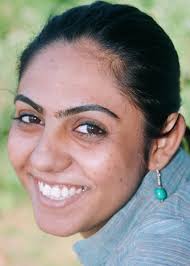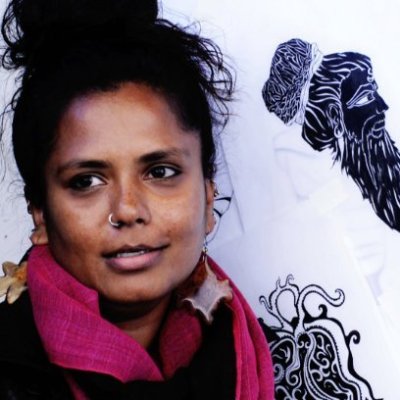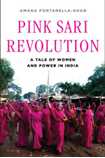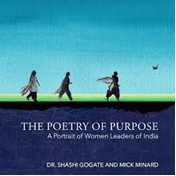|
| |
THIRD ANNUAL IAAC LITERARY FESTIVAL
NYU KIMMEL CENTER, 60 WASHINGTON SQUARE SOUTH, NYC
|
| OCTOBER 7-9, 2016 |
| |
| Saturday Oct 8, 2016 12:15 - 1:15 pm |
|
| |
| AVID@IAAC |
Session 2B
Blueprints for Art and Social Change: A first hand view of the power of arts for awareness, advocacy and justice in the Indian context |
Gopika Jadeja, Priyanka Dasgupta and Amana Fontanella-Khan in conversation with Mick Minard
 |
| |
| How is art breaking out of the gilded gallery to confront real issues on ground and inspire social change? What are the new blueprints for the 21st-century artist-activist dabbling in multiple genres including arts, writing, ecology, inclusion and politics. Join our speakers on their journeys, how to be heard in the internet age and make a difference through art. |
|
|
|
| |
| Gopika Jadeja |
 Gopika Jadeja is a poet and translator from India. She publishes and edits the print journal and a series of pamphlets of a performance-publishing project called Five Issues. Gopika has convened a series of events and a school specific festival of arts called ‘Talking Gandhi’. Creating a place for the arts in the curriculum is one of Gopika’s abiding interests. As a researcher her interests range from postcolonial literatures, especially South Asian literatures and women’s writing to Dalit studies and translation. Her current research weaves together Dalit literature and the Dalit movement in Gujarat in the light of ideas of inclusion and exclusion within the nation. A recipient of the Charles Wallace Scholarship for Creative Writing, Gopika has released a chapbook of poems in collaboration with Visthar-Bangalore. She has collaborated on short term and long-term projects on writing for Poets Against War (India), Women for the Record-Singapore, DNA newspaper and National Institute of Design-Ahmedabad. Her work has been published in Asymptote, The Four Quarters Magazine, The Wolf, Indian Literature, Vahi, etc. She is currently working on a project of English translations of poetry from Gujarat. Gopika studied at St. Xavier’s College-Ahmedabad and SOAS-London. She currently lives and works in Singapore Gopika Jadeja is a poet and translator from India. She publishes and edits the print journal and a series of pamphlets of a performance-publishing project called Five Issues. Gopika has convened a series of events and a school specific festival of arts called ‘Talking Gandhi’. Creating a place for the arts in the curriculum is one of Gopika’s abiding interests. As a researcher her interests range from postcolonial literatures, especially South Asian literatures and women’s writing to Dalit studies and translation. Her current research weaves together Dalit literature and the Dalit movement in Gujarat in the light of ideas of inclusion and exclusion within the nation. A recipient of the Charles Wallace Scholarship for Creative Writing, Gopika has released a chapbook of poems in collaboration with Visthar-Bangalore. She has collaborated on short term and long-term projects on writing for Poets Against War (India), Women for the Record-Singapore, DNA newspaper and National Institute of Design-Ahmedabad. Her work has been published in Asymptote, The Four Quarters Magazine, The Wolf, Indian Literature, Vahi, etc. She is currently working on a project of English translations of poetry from Gujarat. Gopika studied at St. Xavier’s College-Ahmedabad and SOAS-London. She currently lives and works in Singapore |
|
| Priyanka Dasgupta: |
 Priyanka Dasgupta is a visual artist with an interdisciplinary, research based practice. She works across the mediums of photography, video, sound and sculpture, developing work that trespasses boundaries between digital and traditional media, and those between art, education and social practice. Priyanka is currently developing a body of work in collaboration with her husband, Chad Marshall, which explores the "passing" of the Bengali lascars as Black and Latino, to escape the harsh laws against asian immigrants in the US in the late nineteenth and early twentieth century, alongside similar instances in India, where Africans “passed” as Indian in order to escape slavery. The work confronts some of the more reductive, divisive strategies of contemporary culture, often mirrored in the art world, where the public is repeatedly categorized, divided and restrained by their nationality or ethnicity. This confrontation, through layering the historical understanding of the social practice of “passing” as “white”, and complicating it with the complexities of “other” lived experiences which may have been forgotten in the convenience of a binary, linear presentation of history, is intended to inform contemporary discourse on race, power and privilege, and challenge the relevance of these divisive tactics in an increasingly complex and trans-cultural/racial/gendered global society.
Priyanka Dasgupta is a visual artist with an interdisciplinary, research based practice. She works across the mediums of photography, video, sound and sculpture, developing work that trespasses boundaries between digital and traditional media, and those between art, education and social practice. Priyanka is currently developing a body of work in collaboration with her husband, Chad Marshall, which explores the "passing" of the Bengali lascars as Black and Latino, to escape the harsh laws against asian immigrants in the US in the late nineteenth and early twentieth century, alongside similar instances in India, where Africans “passed” as Indian in order to escape slavery. The work confronts some of the more reductive, divisive strategies of contemporary culture, often mirrored in the art world, where the public is repeatedly categorized, divided and restrained by their nationality or ethnicity. This confrontation, through layering the historical understanding of the social practice of “passing” as “white”, and complicating it with the complexities of “other” lived experiences which may have been forgotten in the convenience of a binary, linear presentation of history, is intended to inform contemporary discourse on race, power and privilege, and challenge the relevance of these divisive tactics in an increasingly complex and trans-cultural/racial/gendered global society.
Priyanka has a MA in Studio Art from New York University and the International Center of Photography, New York (2003), and a BA in English Literature from St. Stephen’s College, Delhi University, Delhi (2000). Priyanka is represented by Shrine Empire Gallery in New Delhi, India, and lives in New York, where she is currently completing the Digital and Interdisciplinary Art Practice MFA at the City College of New York while teaching contemporary art, education and media studies at New York University and City College |
|
| Amana Fontanella-Khan |
 Amana Fontanella-Khan: The Gulabi Gang is an Indian women’s group of pink sari-wearing vigilantes who wield laathis (bamboo sticks) and tackle domestic abuse and other violence against women, in addition to other issues. Pink Sari Revolution: A Tale of Women and Power in India tells the story of the gang with a focus on the founder Sampat Pal, the wife of an ice cream vendor, mother of five children, and a former government health worker. The author of Pink Sari Revolution, Amana Fontanella-Khan, writes regularly on issues such as prostitution, rape, reproductive issues and women’s empowerment. She is a contributor to Slate, the Daily Beast, the New York Times, the Christian Science Monitor, and was formerly a contributing editor at Vogue India. The Brussels-based author also lived in India for over four years, so it’s not hard to see why she wanted to write a book on the Gulabi Gang and its founder after hearing about them. Fontanella-Khan spent time in Bundelkhand, Uttar Pradesh, with Sampat Pal and her family. Read the interview to learn more about that experience, the author’s thoughts on the Gulabi gang and violence, and what might happen if Pal officially moves into politics. After the interview, read an excerpt from Pink Sari Revolution. Amana Fontanella-Khan: The Gulabi Gang is an Indian women’s group of pink sari-wearing vigilantes who wield laathis (bamboo sticks) and tackle domestic abuse and other violence against women, in addition to other issues. Pink Sari Revolution: A Tale of Women and Power in India tells the story of the gang with a focus on the founder Sampat Pal, the wife of an ice cream vendor, mother of five children, and a former government health worker. The author of Pink Sari Revolution, Amana Fontanella-Khan, writes regularly on issues such as prostitution, rape, reproductive issues and women’s empowerment. She is a contributor to Slate, the Daily Beast, the New York Times, the Christian Science Monitor, and was formerly a contributing editor at Vogue India. The Brussels-based author also lived in India for over four years, so it’s not hard to see why she wanted to write a book on the Gulabi Gang and its founder after hearing about them. Fontanella-Khan spent time in Bundelkhand, Uttar Pradesh, with Sampat Pal and her family. Read the interview to learn more about that experience, the author’s thoughts on the Gulabi gang and violence, and what might happen if Pal officially moves into politics. After the interview, read an excerpt from Pink Sari Revolution. |
| |
| Pink Sari Revolution |
 In Uttar Pradesh - known as the ""badlands"" of India - a woman’s life is not entirely her own. This is one explanation for how Sheelu, a seventeen-year-old girl, ended up in jail after fleeing her service in the home of a powerful local legislator. In a region plagued by corruption, an incident like this might have gone unnoticed - except that it captured the attention of Sampat Pal, leader of India’s infamous Gulabi (Pink) Gang.
Poor and illiterate, married off around the age of twelve, pregnant with her first child at fifteen, and prohibited from attending school, Sampat Pal has risen to become the courageous commander and chief of a women’s brigade numbering in the tens of thousands. Uniformed in pink saris and carrying pink batons, they aim to intervene wherever other women are victims of abuse or injustice. Joined in her struggle by Babuji, a sensitive man whose intellectualism complements her innate sense of justice, and by a host of passionate field commanders, Sampat Pal has confronted policemen and gangsters, officiated love marriages, and empowered women to become financially independent." In Uttar Pradesh - known as the ""badlands"" of India - a woman’s life is not entirely her own. This is one explanation for how Sheelu, a seventeen-year-old girl, ended up in jail after fleeing her service in the home of a powerful local legislator. In a region plagued by corruption, an incident like this might have gone unnoticed - except that it captured the attention of Sampat Pal, leader of India’s infamous Gulabi (Pink) Gang.
Poor and illiterate, married off around the age of twelve, pregnant with her first child at fifteen, and prohibited from attending school, Sampat Pal has risen to become the courageous commander and chief of a women’s brigade numbering in the tens of thousands. Uniformed in pink saris and carrying pink batons, they aim to intervene wherever other women are victims of abuse or injustice. Joined in her struggle by Babuji, a sensitive man whose intellectualism complements her innate sense of justice, and by a host of passionate field commanders, Sampat Pal has confronted policemen and gangsters, officiated love marriages, and empowered women to become financially independent." |
|
 Mick Minard is a writer, photographer, and an experienced strategy consultant specializing in program design, marketing communications, and impact assessment. Over the past twenty years, her professional and artistic work has largely been focused on promoting promising ideas for restoring connection between human society and the natural world. Her photographs have been exhibited in New York City and sold commercially, and she uses visual and written narrative to inspire new forms of leadership, organizational transformation, and community engagement. Since 1998, Mick has worked in the United States, Europe, East Africa, and South Asia, with both non-profit and for-profit social ventures, and she has facilitated the growth of early-stage capacity-building and income-generating initiatives serving the underprivileged and the rural poor. Mick Minard is a writer, photographer, and an experienced strategy consultant specializing in program design, marketing communications, and impact assessment. Over the past twenty years, her professional and artistic work has largely been focused on promoting promising ideas for restoring connection between human society and the natural world. Her photographs have been exhibited in New York City and sold commercially, and she uses visual and written narrative to inspire new forms of leadership, organizational transformation, and community engagement. Since 1998, Mick has worked in the United States, Europe, East Africa, and South Asia, with both non-profit and for-profit social ventures, and she has facilitated the growth of early-stage capacity-building and income-generating initiatives serving the underprivileged and the rural poor. |
| |
| The Poetry Of Purpose |
 This book carries a message about the essential nature of women’s leadership in India, and its nexus - The spirit of active participation in social change. Through photographic portraits, moments of insight and personal reflections from fifteen women leaders across India, the poetry of purpose reveals a path from self-discovery and awareness of choice, to the desire to strive in the service of others. This book carries a message about the essential nature of women’s leadership in India, and its nexus - The spirit of active participation in social change. Through photographic portraits, moments of insight and personal reflections from fifteen women leaders across India, the poetry of purpose reveals a path from self-discovery and awareness of choice, to the desire to strive in the service of others. |
|
|
| |
|
|

